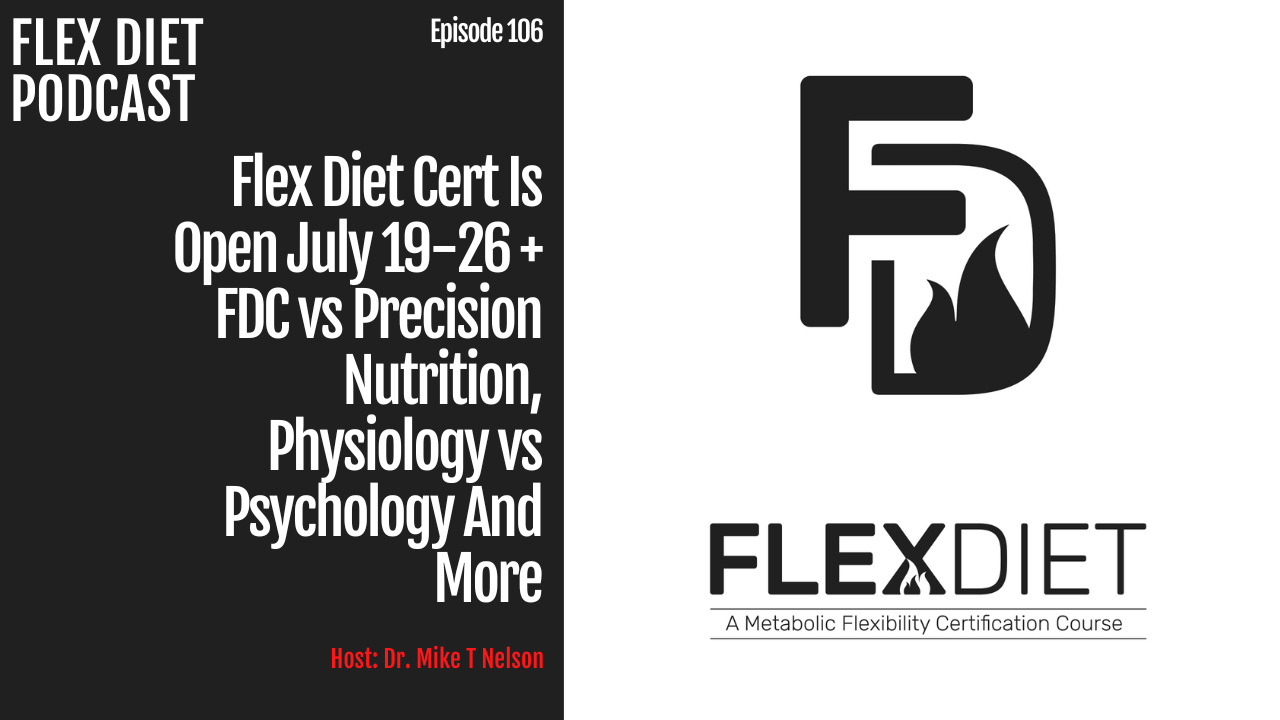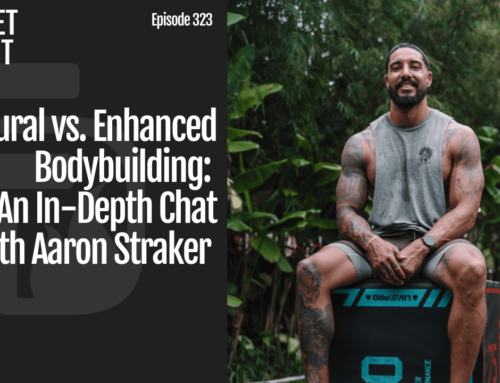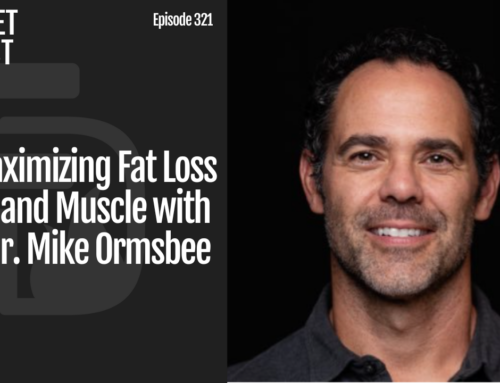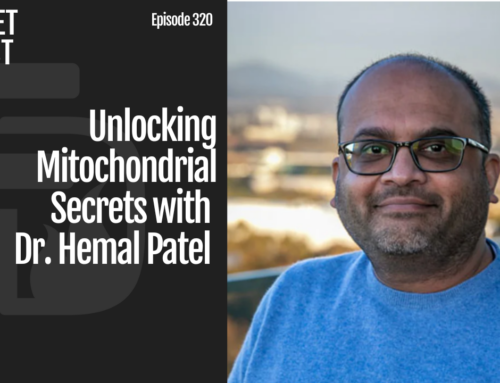Today’s short solo cast includes a tip to help body composition and performance. This podcast also serves as a reminder that the Flex Diet Certification is closing at midnight on Monday, June 13th.
Go to flexdiet.com to enroll. If you’re outside of the enrollment window, sign up for the waitlist and I’ll notify you when it opens again.
Episode Notes
-
Why I designed the Flex Diet Cert
- How to increase your ability to burn fat as fuel
- Who shouldn’t use this intervention?
- How the Cert covers action items related to the intervention
The Flex Diet Podcast is brought to you by the Flex Diet Certification. Go to https://flexdiet.com/ for 8 interventions on nutrition and recovery. The course is open for enrollment from June 6 – to June 13, 2022. If you are outside the enrollment window, sign up for the waitlist and you’ll be notified when the course opens again.
Rock on!

Dr. Mike T Nelson

Dr. Mike T Nelson
PhD, MSME, CISSN, CSCS Carrick Institute Adjunct Professor Dr. Mike T. Nelson has spent 18 years of his life learning how the human body works, specifically focusing on how to properly condition it to burn fat and become stronger, more flexible, and healthier. He’s has a PhD in Exercise Physiology, a BA in Natural Science, and an MS in Biomechanics. He’s an adjunct professor and a member of the American College of Sports Medicine. He’s been called in to share his techniques with top government agencies. The techniques he’s developed and the results Mike gets for his clients have been featured in international magazines, in scientific publications, and on websites across the globe.
- PhD in Exercise Physiology
- BA in Natural Science
- MS in Biomechanics
- Adjunct Professor in Human
- Performance for Carrick Institute for Functional Neurology
- Adjunct Professor and Member of American College of Sports Medicine
- Instructor at Broadview University
- Professional Nutritional
- Member of the American Society for Nutrition
- Professional Sports Nutrition
- Member of the International Society for Sports Nutrition
- Professional NSCA Member
Dr. Mike T Nelson
Welcome back to the flex diet podcast. I’m your host, Dr. Mike T. Nelson. And today is just a very short solo cast for me with a tip to help body composition and performance, then a reminder that the flex diet certification is closing. So depending on when you listen to this, it is closing Tuesday, I’m sorry, it’s actually closing on Monday, which would be early Tuesday morning. But Monday evening, June the 13th at midnight CST, and I’m not staying up to switch the page over. So if you really want to push it, yeah, you could probably still enroll super early on Tuesday. But warning, I do get up pretty early. And I will close it once I get up in the morning. So for all practical purposes, it ends June 13 2022. At midnight, so go to flexdiet.com.
For all the information there. If you have any questions, by all means, send me a note. So flex diet certification is eight different interventions to maximize nutrition and recovery. We cover everything from protein, fats, carbohydrates, different types of intermittent fasting, a little bit about keto, micro nutrition, basic principles of exercise, sleep, and much more. This is all done in a flexible framework, so that you can complete it yourself or especially if you’re coaching others. When a lot of gyms were open, when I was kind of touring and doing a lot more lectures before COVID, I was pretty surprised that a lot of gyms didn’t really do much for nutrition and recovery. Right. So kind of like the Lila brada coat, the quote, you can think of a nutrition and training as two wheels on a bike, if one of them is completely missing or square, you want to focus on that wheel.
So of course, training is going to be important, you need to have a stimulus to the system to get better. But for a lot of gyms, what I found was, they didn’t really have any training system per se. Some of them did, which was awesome. But even fewer had anything that they did for nutrition, they may throw random challenges at clients. But that gets really confusing. When one month you’re doing some intermittent fasting challenge. And the next month, it’s keto. And then the next month that’s whole 30, or paleo or whatever. So it just got to be really confusing.
And the biggest problem was they didn’t have a system to do a semi customizable approach with nutrition. So they didn’t have the bandwidth to do it. The nutrition world is extremely confusing. Everybody is selling you the one thing that’s gonna change your body comp and performance. And the reality is it isn’t just one thing, it’s multiple things, it need to know which thing to use, at which time need to understand the concept and the context of the different interventions. So for example, intermittent fasting, which we’ll talk a little bit about hear, might be very useful for some clients, and might be utterly horrible. For some other clients. It all just depends.
So like my buddy, Dr. Ben House has said, If you don’t understand the context, then you’re probably going to be a little bit dangerous, or at least not get the results for your clients that you need. So when I designed the flex diet cert, it was designed so that you could have one person say at a gym, manage up to 100 people doing a semi customizable approach to nutrition. As you can imagine, that would literally pay for itself in a couple of days, and clients are going to get much better results from it. Most people we’re entering gyms do have some performance goals.
But a lot of times it’s body composition. And if body composition is a goal, nutrition is going to be a huge component of that. We can argue what percentage, but for most people, it’s going to be a pretty big percentage, just spend more time eating than they are training. So modifications to that are going to serve them really well. So go to flex diet.com flxdt.com. For all the information and the details. You can contact me if you have any specific questions on it. So one of the things I talk about in the flextight search is a concept of intermittent fasting. And for most clients who do body composition, not all I do use some type of intermittent fasting.
I got into this probably almost 12 years ago now. I was looking for an intervention that would increase the body’s ability to use fat as a fuel right which will increase metabolic flexibility metabolic flexibility is how well can you use carbohydrates on one end of the spectrum, which is great for performance. And how well can you use fat on the other end of the spectrum, which is much better for health and body composition. Okay, that’s a little bit overly simplistic. But metabolic flexibility is also a marker of health. And if you have better metabolic flexibility, most of the time you are going to perform better, and you’ve increased the capacity of the body to use fat as a fuel.
Therefore, when you’re cutting calories, or doing things like fasting, it’s going to be much easier to do. So we want to use carbohydrates for high intensity exercise. And we want to use fat for lower intensity exercise or kind of day to day events, does not necessarily mean that you have to do a low carbohydrate approach that may be beneficial for some clients. But we want to keep an eye on their performance also. So metabolic flexibility gives you the best of both worlds, you can still see increases in performance. And you can still down regulate and downshift to use fat when you’re not doing higher intensity exercise.
And this can happen even when you are still consuming carbohydrates. I’ve got one client who has metabolic heart, it’s a very fancy machine that will measure directly how much fat and carbohydrates are using. He’s been eating, you know, upwards of 380 to 400 grams of carbohydrates per day. And when we test his body’s ability to use fat, it’s still really, really good. So yes, you can do a lower carb approach, that’s one method. But you can also consume higher amounts of carbohydrates and some individuals.
And if their metabolic flexibility is still really good. This will not necessarily completely blunt all their body’s ability to use fat. So going back to intermittent fasting, I got into it was looking for an intervention, that would increase the body’s ability to use fat. Obviously, exercise will do this. Some drugs that may be legally illegal might, most supplements generally are not very good at doing that, at least any substantial degree.
But what I realized is when you’re fasting, you’re not consuming anything that contains calories, you’re not consuming anything with calories, your normal insulin levels will start to go down. When insulin goes down, it’s more of a fuel selector switch, which I stole from Dr. Jeff Bullock, lower levels of insulin will push your body to use more fat as a fuel. Higher levels of insulin will push your body to use more carbohydrates as a fuel. So both of these instances are useful.
Underneath the right context. When we look at the literature, what we find is people’s ability to use fat is extremely variable. There’s some very cool studies that have been done, where they just plucked, recreationally active is usually younger people anywhere from 20 to age, mid 30s, off the street, and we hooked them up to a metabolic heart very fancy equipment in the lab. And they measured their body’s ability to use fat under low levels of exercise. What they found was that some people were really, really good at using fat during low levels of exercise. So that’s great. They had probably pretty good metabolic flexibility, at least on the fat end of the spectrum.
Other people and again, these were healthy individuals and recreationally active, these were not overweight couch potatoes. Even in that population in humans, these are not, you know, one eyed diabetic ferrets or anything like that. They were not very good at using fat as a fuel. And there was a huge amount of variability so 20 to like 93% difference in people’s ability to use fat as a fuel. These studies were done helds did one study in 1999. Good Deki did one study. And then I published part of this as my PhD dissertation looking at this also. And all three of those studies showed that the body’s ability to use fat in different populations was really variable.
So even in a snapshot of generally healthy, recreational, athletic people, not all of them were using fat to the highest degree. So I was like, oh, that’s kind of interesting. So can we think of any other interventions that can upregulate the body’s ability to use fat? And it turns out fasting does that by pushing insulin levels down? The other benefit, of course of intermittent fasting is that you have a period of time where you’re not consuming any calories. So this can be an easy way for people to be in a caloric deficit. At the end of the day, like calories still matter, yes, calories in calories out matters, it does get exceedingly more complicated than that.
But if you want to lose weight, you must be in a caloric deficit somehow. And the definition we’re using here of intermittent fasting is a period of time where you are not consuming any calories. So that’s why intermittent fasting turned out to be the second intervention that I have in the flex diet certification. My bias for that there’s a whole bunch of different ways to do intermittent fasting. But I generally find that working up to one longer fast only once per week, is beneficial. So you’d work up to a 19 to 24 hour fast, about once per week. Ideally, this would be on an off day, or a day where you’re just doing some light cardiovascular or aerobic type training. And advanced athletes, you could do this on a training day.
But I generally find after looking at heart rate variability, and hundreds of people at this point probably 1000s of measures of HRV, that can be a little bit too stressful for most people. Now, one of the caveats with this is that not everyone should use intermittent fasting, right? What I find is that if someone has very high stress, and they tend to get stressed and skip meals, I probably will not recommend that they would use an intermittent fasting approach. Now they may get to it, or they might use a shorter time duration.
But working up to a 24 hour fast and those individuals I find is a little bit too stressful. You can keep an eye on this by measuring heart rate variability, which I would recommend, again, I’ve got a separate course on that, too. So people were very high stress. And alas them when you get real stressed, do you tend to overeat? Or do you tend just to skip meals, they tend to skip meals. And their HRV readings are pretty wonky, intermittent fasting is not one of the top things I’m going to do with them, because it is a stressor to the system. You know, stressor to the system is not necessarily bad exercise is a stressor to the system. But if we kind of overwhelm their body’s ability to recover, there’s other starting points are going to be much more beneficial for high stress individuals.
These would be a protein, like I talked about on the last podcast before maybe looking at micro nutrition, we might play around with some fats, different types and forms of exercise, etc. So the takeaway from this is, I do like intermittent fasting, I think it can be a good approach. My bias is doing it as a concentrated stressor, most typically once per week.
And in the flex diet cert, I go over the exact protocol that I use to get people prepared for that. So I do have a specific ramping period for six to eight weeks, so that they can be ready to do a longer fast, and jumping into a 24 hour fast for most individuals is going to be too big of a jump. Be like if you came to train in my garage gym here, and you’ve never dead lifted before. And we just stick 405 on the bar, I just yell at you to try harder. That’s not really the best coaching approach, it’d be much better to scale it to whatever your capacity is. That’s 95 pounds to 25 315 whatever, right unless you’re Andy Bolton, I think pulled 500 pounds or something crazy. The first time you ever deadlift at at age 18 405 For someone who’s never really trained before, probably going to be a little bit too much. Right. So just like fasting, having someone go for 24 hours and white knuckle it all the way through, probably too big of a jump.
So on the flex diet cert, I go over the exact ramping period to use for that. And again, I think intermittent fasting can be incredibly useful. We are pushing down levels of insulin healthy individuals, this is going to upregulate the body’s ability to use fat. And it is not probably the best idea in high stress individuals. So this is why in the cert I talk a lot about context of metabolic flexibility and flexible dieting, so that you know when to use each one of the interventions. So again, there’s not going to be one intervention that’s going to work for absolutely everyone, despite what all the fasting zealots may say. But I do find that fasting can be very, very useful in the correct population.
If you want more information on the flex diet certification, go to flexdiet.com and they will have all the details. It is now open until midnight or so June 13 2022. If you’re listening after that time, you can still go to flex diet.com And you’ll be able to get on the waitlist for the next time that it is open. So thank you so much really appreciate you listening to the podcast. If you enjoyed this one, make sure to check out Flexdiet.com Leave us whatever stars you feel are appropriate and your reviews are appreciated. If you have any questions about the certification, you’ll be able to find me through the website there or the website Mike t nelson.com. more than willing to help answer any questions you have. So thank you so much. I greatly appreciate it. We’ll talk to you again very soon.















Leave A Comment